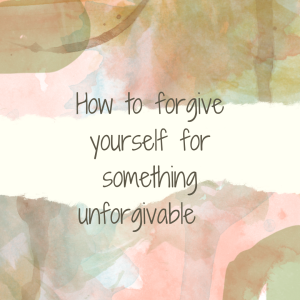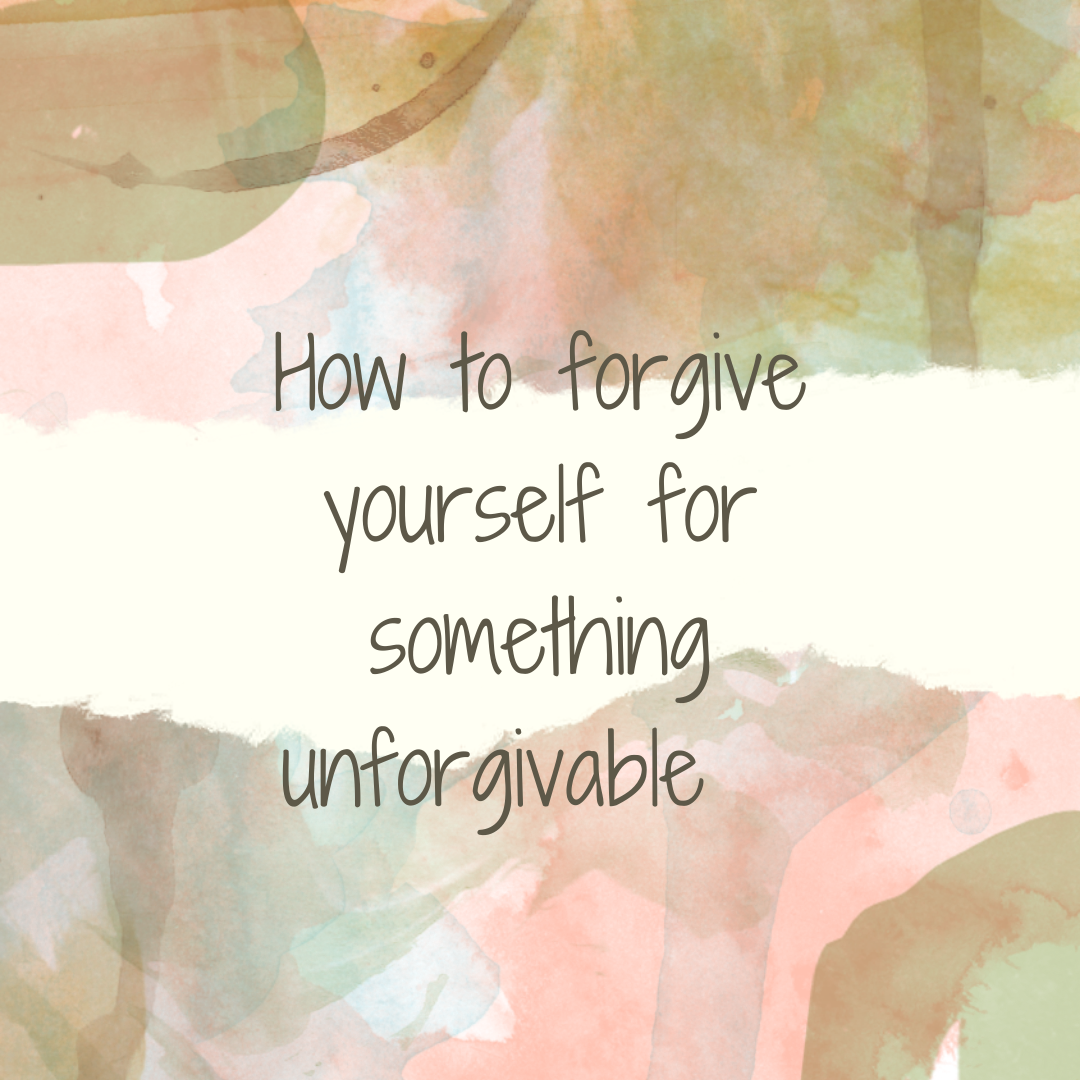
Are you in search of how to forgive yourself for something unforgivable?
Then this blog is just right for you.
Anyone who has ever been in a relationship can tell you that, at some point, they’ve had to decide to either forgive or not forgive someone for something they’ve done.
Sometimes people can forgive a transgression quickly and, other times, it takes a while longer.
In this blog, we’re going to be taking a look at how to forgive yourself for something unforgivable.
The thought of forgiving yourself for something unforgivable might have you saying — well that’s impossible.
But it’s not.
I’ve found that just about every single person on this planet can forgive and be forgiven.
And even though forgiving yourself for something may seem hard you will feel a sense of peace and contentment when you do.
Daily life is filled with little stresses, frustrations, and hassles that can take their toll when they pile up.
The regrets and sense of guilt you may feel over something you’ve done in the past can grow heavy and drag your mood down like an anchor.
But there is a way to let go of the past — to forgive yourself for something unforgivable.
I wish I could tell you that you’re always going to make the right decisions, but life doesn’t work like that.
Mistakes happen, and sometimes we have to live with the consequences for years, even decades on end.
Forgiving yourself for something unforgivable is a lifelong journey.
It takes time, healing, and acceptance to find peace and move past old mistakes.
But honestly, forgiving yourself doesn’t need to be complicated or take years.
The easier you make it on yourself and focus on your healing, the faster you’ll embrace a life of forgiveness.
Unforgivable actions shouldn’t have to weigh on you for the rest of your life.
You should be able to get beyond that one action, even if it affected a lot of people.
The feeling of shame will linger, but take a few steps to get over that feeling of guilt and move on.
Have you ever done something horrible?
I mean, so horrible that you’ll regret it the rest of your life?
You can forgive yourself, even if no one else is willing to do so.
The sooner you forgive yourself, the sooner you reach inner peace.
Sometimes, we do unforgivable things.
It’s a pain in the neck and part of us will always regret that decision.
How do you forgive a mistake you’ve made?
Why do we get stuck on something so small?
How to forgive yourself for something unforgivable?
How to move on?
These are the most common questions asked by my readers.
Most of us know how important it is to forgive others, but we rarely think about the importance of forgiving ourselves.
We live in a world with unforgivable acts, but that doesn’t mean we need to embrace that belief on our own.
It can be challenging to forgive yourself for something you regret or feel ashamed of, but there are some very real benefits to doing so.
It’s important to know that you aren’t going to be able to forgive yourself right away.
It takes time.
And it might take some help.
You might want to talk with a counselor or therapist who can help you work through your feelings and the guilt you’re experiencing.
How To Forgive Yourself For Something Unforgivable
Sometimes, just talking through your feelings helps you understand them better, which can lead to forgiveness.
Here are some other things you can try
1. Write Down What You Did
To forgive yourself, you need to understand the situation.
You can’t move on if you don’t know what happened in the first place.
Writing your story down will help you revisit it and see it from a different perspective than when it occurred.
2. Don’t Let Any One Event Define Who You Are
Wondering how to forgive yourself for something unforgivable?
Believe it or not, one mistake does not define who you are as a person.
You are human and all human beings make mistakes.
You did something wrong, but there is no reason why this should change your perception of yourself.
Your actions should not erase all of your good qualities or prevent you from doing good things in the future.
You are still a person with positive qualities, so don’t let one incident define who you are as a whole person.
3. Talk About It
Even if you don’t talk with a therapist or counselor, talking about what happened is important.
Find someone you trust, who won’t judge you for what happened, and explain how you’re feeling.
4. Reach Out For Support
If there’s someone who was affected by what happened, consider reaching out to them and telling them how sorry you are and that you want to make amends.
Of course, this isn’t always possible or appropriate.
Try not to blame yourself for something that wasn’t totally in your control.
We all make mistakes but we don’t always have control over everything that happens in our lives.
An apology is often enough to move forward, especially if the person who was hurt accepts it and forgives you.
5. Give Yourself A Break
You’re human, and you’re going to make mistakes.
By recognizing that you’re not perfect and never will be, you can start to accept your flaws and let go of the guilt you feel when you do something wrong.
6. Recognize That Your Past Does Not Define Your Future
If you’re beating yourself up over something that happened in the past, try to remember that it’s not happening right now.
It doesn’t have to define who you are or what your life is like today.
You can choose who you want to be in the here and now.
7. Be Kinder To Yourself
If you’re thinking of how to forgive yourself for something unforgivable, you can try being kinder to yourself.
Stop beating yourself up for what you did already.
If you can’t stop beating yourself up, find someone who will be kind to you the way you should be.
Maybe a friend or a therapist.
You need someone who will see the good in you and help remind you of it when you don’t remember it on your own.
8. Try To Learn From What Happened So That It Doesn’t Happen Again
This is one of the hardest things because life is full of mistakes, big and small and all of them teach us lessons: how to cope with stressors, how other people feel, how not to treat others, how the world works, etc…
Learn them and move on.
Forgive yourself so that you can keep healthily learning those lessons.
9. Remember That We All Make Mistakes
Thinking of how to forgive yourself for something unforgivable?
No one is perfect – there’s no such thing as someone who never makes a mistake.
If you’re feeling guilty about something you’ve done in the past, remember that you’re not alone and that everyone makes mistakes.
Try to be kind to yourself and recognize that it’s normal to do something wrong every once in a while.
10. Stop Punishing Yourself
The most important step towards forgiving yourself is to stop punishing yourself for what you did.
How many times have you replayed the event in your head?
How many times have you told yourself that it was all your fault?
How many times have you blamed yourself, only to then blame yourself for blaming yourself?
So, what’s the way forward on how to forgive yourself for something unforgivable?
When it comes to forgiving ourselves for mistakes we’ve made, we need to remember that self-punishment doesn’t change anything.
Instead, it creates a vicious cycle where we feel guilty and punish ourselves for feeling guilty – and so the cycle continues.
11. Open Up To Someone Else About What Happened
The more details you share, the better, because the truth will set you free.
When you open up about what happened, it’ll pull the weight off your shoulders immediately.
Even if that person gets mad at you initially, they’ll get over it.
This is why people who cheat on their partners feel so much better after confessing… even if they know their partner will be furious at them for cheating.
12. Reflect On Your Actions Without Judgment
Reflect on the situation that has been causing you distress or pain and ask yourself what happened.
Try not to judge or criticize yourself while doing this, just try to understand what led you to act the way you did at that moment.
The past cannot be changed, so it is important to accept it without regret or judgment and move forward healthily.
In other words, don’t beat yourself up over what happened, because it will only make things worse.
Move forward in a positive direction instead.
Mindfulness is an important aspect of letting go of something unforgivable.
It also helps when you can forgive the person who hurt you.
When you have finally forgiven yourself and the other individual, you should be able to move on with your life in a healthier way.
Forgiving yourself for an unforgivable act is difficult.
But if you’re able to achieve genuine forgiveness for yourself, you will also be released from the emotional burden that has been weighing you down.
Doing so takes time and patience.
You won’t likely be able to accomplish it in a short amount of time, but it is still possible nonetheless.

